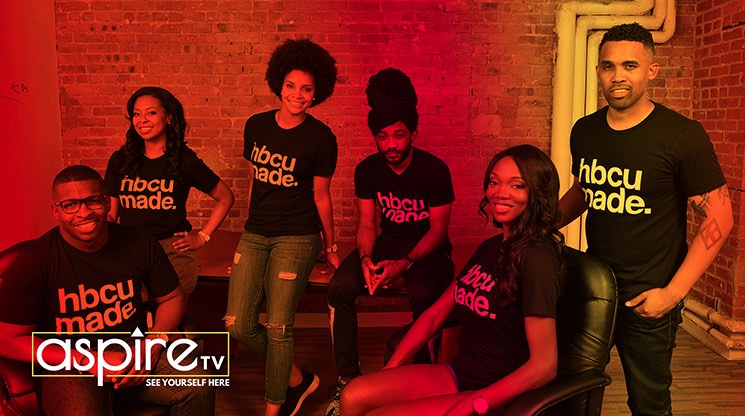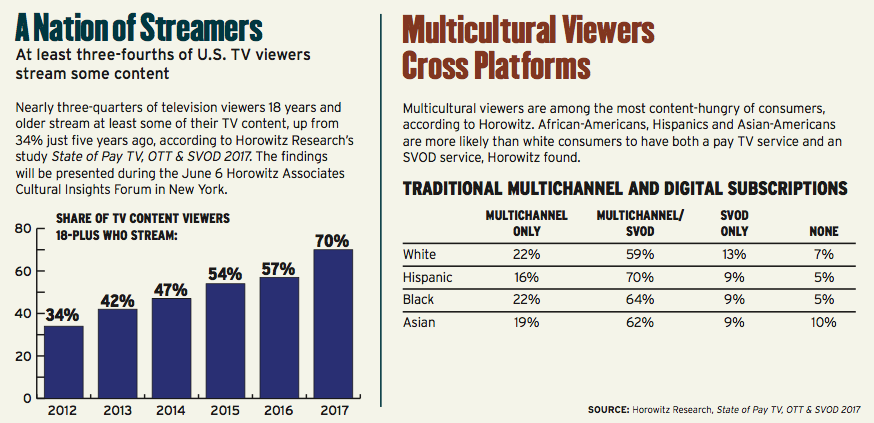Channeling Their Course in Diversity

The smarter way to stay on top of broadcasting and cable industry. Sign up below
You are now subscribed
Your newsletter sign-up was successful
Comcast is in the process of, in 2019, launching on its cable systems two new Hispanic-targeted kids networks, fulfilling a condition agreed to in its 2011 acquisition of NBCUniversal to launch eight minority-owned and operated channels.
The new channels, Primo TV and Kids Central, will undoubtedly draw interest and some fanfare, given that few networks cater to an emerging audience of young Hispanics under 18, who make up nearly half of all U.S. born Latinos, per Pew Research.
Meanwhile, progress persists at Comcast’s first four multicultural networks, which launched over the past five years. Comcast in 2012 first announced its intentions to launch the networks amid much fanfare, hype and star power: basketball hall-of famer Magic Johnson was tapped to create Aspire TV, targeted to African-American families; hip hop mogul Sean “Diddy” Combs was going to put music videos back on cable with his Revolt TV; filmmaker Robert Rodriguez promised an Hispanic-appealing, action-packed entertainment channel dubbed El Rey Network; and Spanish-language TV veteran Constantino Schwarz launched BabyFirst Americas, designed for infants and young children.
Related: What Diverse Women Watch
Here’s a look at where these networks stand today. Subscriber totals via Nielsen for BabyFirst and El Rey Network; via the networks for Aspire TV and Revolt TV.
Aspire TV
Launched: June 2012
Owner, Founder: Earvin “Magic” Johnson
Subscribers: 35 million
Atlanta-based Aspire TV celebrates its fifth anniversary next month with a new logo and a mandate to offer more urban lifestyles content.
The smarter way to stay on top of broadcasting and cable industry. Sign up below
The brainchild of basketball legend Earvin “Magic” Johnson, Aspire TV is in 35 million homes, surpassing its subscriber expectations at the five-year mark through deals with such MVPDs as Comcast, Charter Communications, DirecTV and Altice USA, VP and general manager Melissa Ingram said. “We certainly didn’t think we would be partners with all of these companies within five years.”
The network in its early years offered cultural-themed originals like the ABFF Independent — a showcase of American Black Film Festival award-winning films set to launch its sixth season this July — as well as acquired movies and sitcoms like Sanford & Son. Its creative energies are now focused on developing content that will reflect how African-Americans live their lives, Ingram said.
“Black audiences over-index on lifestyles programming, so the content revolves around food, fashion and how this audience eats, lives plays and dreams,” she said.
As part of that evolution, the network in the fourth quarter will team with actress/producer Issa Rae (HBO’s Insecure) and chef and TV personality G Garvin to create a yet-to-be-titled food-themed series.
“If you look at the content that Scripps Networks provides, it’s really taking that and merging that with content that’s reflective of black culture, and targeting it to an audience that has historically not seen themselves reflected in that manner on the screen,” Ingram said. “We think we are on to something that really isn’t being done, and where there is no competition.”
Related: Filling Supply for African-American Demand
Aspire TV is also looking to invest in the digital space, relaunching its Aspire.TV digital channel this summer. Later this year comes The Graduates, an original digital series tracking the lives of alumni of historically black colleges and universities (HBCUs) in Atlanta. It’s a spinoff of a 2016 series about HBCU alums in New York.
BabyFirst
Launched: May 2012
Co-Founder, First Media President: Sharon Rechter
Subscribers: 54 million
First Media’s BabyFirst, with programming aimed at babies, toddlers and their parents and claiming access to 55% of moms of babies in the United States, had already been launched by national satellite-TV platforms DirecTV and Dish Network by the time Comcast added substantial distribution on English- and Spanish-language lineups to the mix.
“It made a big difference, but we also knew how to leverage that distribution,” Sharon Rechter, the service’s co-founder, said. The network claims to reach “every second mom in the country” with strong female viewing numbers; the average length of watching is 110 minutes per day.
Rechter said the network is on most big cable or satellite or telco platforms (Verizon Communications’ Fios TV most recently) other than Cox Communications and Altice USA-owned Optimum. “We’re doing really well on the cable side,” she added, “but I think what we were also able to do is to leverage this audience to grow a media business” with a strong social media platform for millennial women. Content such as “Blossom” and “So Yummy” generated more than 1.4 billion views over the last 30 days on Facebook, without doing outreach marketing, she said. A year ago, BabyFirst’s Facebook page fan base was at 174,000 and today, across platforms, it’s at about 24 million, she said.
BabyFirst content is on Netflix, Amazon and Hulu and, to a more limited extent, on the BabyFirst subscription VOD app. TV content (including on OTT platforms) is aimed at the baby, including fare such as Harry the Bunny and the color-teaching Color Crew, while social content is aimed at the mom, with simple food recipes and life hack videos. Content rates highly in terms of shares and, according to Rechter, in terms of number of views per post. “I give much thanks to Comcast for lighting the fire,” she added.
Related: Opening ‘Gate to Multicultural Stories
Comcast might also indirectly aid Baby-First with content arm NBCUniversal’s plan to convert the Sprout network — an ad-supported channel aimed at preschoolers and their caregivers — into Universal Kids, aimed at older children and their consumer parents. “Obviously there’s less clutter in the market,” she said. “At the end of the day, we are competing on the remote with whatever mom could have elected to put on, and Sprout was definitely a good choice for her to elect.”
El Rey Network
Launched: February 2014
Majority Owner, Founder: Robert Rodriguez
Subscribers: 45 million
Filmmaker Robert Rodriguez — well-known for action-packed movies featuring diverse casts, like the Spy Kids and From Dusk Till Dawn franchises — brought his brand of fast-paced content to cable with the 2014 debut of El Rey Network.
Nearly three years later, El Rey has found its niche with young, English-speaking Hispanic millennial men. A lineup of adrenaline-filled original scripted series and acquired movies has landed it in front of 45 million subscribers.
“If you look at the evolution of cable networks and their progress, El Rey is super-young, but it’s enjoyed pretty substantial growth,” El Rey president Daniel Tibbets said. “Cable is not in a growth period and we’re all competing for the same eyeballs, but we are where we expected to be.”
The network has built its brand on action-heavy programming, from scripted shows like From Dusk Till Dawn: The Series to unscripted series Lucha Underground, based on Mexico’s famed Lucha Libre AAA pro-wrestling organization.
“We own the space that’s representing the Hispanic community and the cinematic, escapist viewing experience that no one else is doing,” Tibbets said. “While we are targeting English-speaking Hispanics, our programming also appeals to a broad spectrum of viewers.”
The network will boost its originals budget more than 50% this year with a mix of scripted and reality series. In unscripted offering Man at Arms, launching June 8, actor Danny Trejo will explore the history of weapons in TV and movies, Tibbets said.
Related: ‘Chicago Med’s’ Tee Breaks Out, Breaks Stereotypes
El Rey is also developing digital-exclusive originals to further extend its brand online and reflect the images and stories of its target audience on-screen.
“From day one, it was the goal to demonstrate the commitment to have diverse voices in front of and behind the camera in management and ownership, and we will continue to be aggressive on that front,” he said. “That’s what you have to do to be reflective of America today — we’re a couple of decades away from where the population shifts and the majority will be persons of color. Those entertainment companies that don’t reflect that change will not survive.”
Revolt TV
Launched: October 2013
Owner, Founder: Sean “‘Diddy” Combs
Subscribers: 50 million
Sean “Diddy” Combs launched Revolt in 2013 saying he wanted to bring music back to TV through a cross-platform brand reaching young, multicultural millennials. Network executives said Revolt is well on its way to hitting those goals.
With a mix of original series, music videos and concert prorgramming, Revolt is now in 50 million homes despite a challenging and crowded climate for linear cable networks.
“We entered the business at a time of significant change,” Derek Ferguson, chief operating officer for Revolt Media & TV, said. “From our standpoint, we’ve been happy with the progress that we’ve made.”
Revolt was built as a multiplatform brand, said Ferguson, launching on social media several months ahead of the cable network. Nonetheless, even its executives couldn’t predict how quickly changes in media consumption would alter the television landscape.
As viewers — particularly younger ones — shifted toward digital services or “skinny bundles,” Revolt’s challenge was to stand out from the pack, Ferguson said. The network now offers eight hours of daily music programming, including a live simulcast of The Breakfast Club, the popular morning show on New York radio station Power 105.1; Revolt Live, a nightly look at music, fashion and culture trends; and Drink Champs, a popular music podcast.
The Revolt Music Conference, a multi-day confab of top performers and music executives, joined the mix in 2013. The event generates content for the channel and its digital platforms and is a conduit to the music community, Ferguson said.
The lack of a level playing field means minority-owned channels still face a tough road ahead, according to Ferguson. “There aren’t a lot of us out there because of the investment required and the often political and non-merit based approach to distribution works,” he said. “Largely a lot of choices are being made based on legacy and large companies demanding a big footprint, and not much is left for great creative ideas from diverse backgrounds, so we’re left fighting for the crumbs.”

R. Thomas Umstead serves as senior content producer, programming for Multichannel News, Broadcasting + Cable and Next TV. During his more than 30-year career as a print and online journalist, Umstead has written articles on a variety of subjects ranging from TV technology, marketing and sports production to content distribution and development. He has provided expert commentary on television issues and trends for such TV, print, radio and streaming outlets as Fox News, CNBC, the Today show, USA Today, The New York Times and National Public Radio. Umstead has also filmed, produced and edited more than 100 original video interviews, profiles and news reports featuring key cable television executives as well as entertainers and celebrity personalities.

